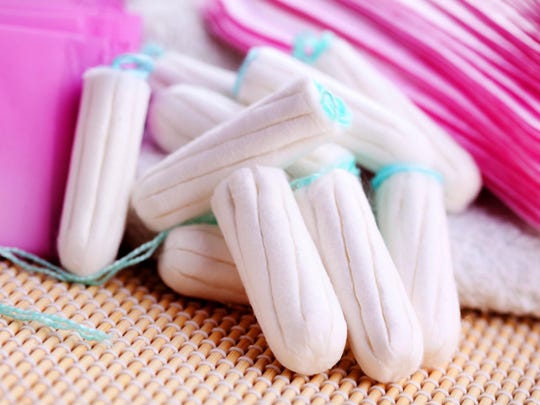OLYMPIA — Two bills introduced this legislative session would make it easier for women, including public school students, to get menstrual supplies.
Senate Bill 6073 would require schools to provide sanitary pads and tampons to students at no cost in bathrooms designated for females or as gender-neutral in schools serving grades six through 12.
House Bill 1053 would provide a sales and use tax exemption for feminine hygiene products.
A nationwide movement to de-stigmatize menstruation has gained momentum in the past few years and with it, a campaign to end “period poverty,” or the loss of opportunities, including education, when women and girls can’t afford menstrual supplies.
Proponents of both bills say they want to advance “menstrual equity,” removing barriers women face when on their periods.
According to a recent Harris poll cited by backers of menstrual equity laws, more than four in five students in the U.S. have either missed class time or know someone who missed class for lack of access to feminine hygiene products.
“Most women can remember how awkward and embarrassing this situation was when we were young,” said Christine Rolfes, D-Bainbridge Island, a co-sponsor of the school sanitary supply bill. “And it makes sense that a district would help girls to avoid missing classroom time because they forgot, or because their home doesn’t have hygiene supplies.”
The estimated cost to districts statewide during the first two school years is $2.95 million, according to a fiscal analysis. That includes more than $2 million for dispensers in an estimated 10,109 bathrooms at a cost of $200 each, plus an estimated $466,610 per year for supplies. In fiscal year 2023 and beyond, the cost would be for supplies alone.
The impetus for the school supply bill came from a group of students at Lake Washington High School in Kirkland, according to Sen. Manka Dhingra, D-Redmond, prime sponsor. The students testified Jan. 17 before the Senate Early Learning & K-12 Education Committee.
Caroline Schmale, a Lake Washington senior who spoke, estimates on any given day in Washington state thousands of girls get their period at school, some during class.
“(They) have had to find a way to get a tampon or pad before continuing their school day,” Schmale said. “So they might have had to sneak back into class to grab one from their bag or ask their friends to see if anyone has extra.”
Sure, they could go to the nurses’ office, where limited supplies are usually kept, Schmale said, but that interrupts class, and some girls are embarrassed to ask. Schmale said some school nurses don’t always have tampons or pads on hand, forcing girls to go home.
The Harris poll found that 61% of teens surveyed have worn a pad or tampon for more than four hours because they lacked access to supplies. Schmale said, echoing the national platform, which puts girls and women at risk for bacterial infections and toxic shock syndrome, a potentially fatal condition.
“We don’t ask people to go to the school nurse to get toilet paper,” Dhingra said. “Why should we expect them to go to the nurse for feminine hygiene products? This bill is about normalizing the human body and removing stigma.”
Dhingra said the new state mandate would encourage districts to work with community partners, “as many are already doing.”
Sen. Keith Wagoner, R-Sedro Woolley and a member of the Early Learning & K-12 committee, said he liked the concept but wondered about the fiscal impact, which wasn’t available at the committee meeting.
SB 6073 was discussed by the Central Kitsap school board at a recent meeting among bills the board would be tracking. Board President Jeanie Schulze said the board was concerned with unfunded mandates, but she didn’t single out the sanitary supply bill.
The district doesn’t do cost estimates on bills as they move through the Legislature, said spokesman David Beil. “We will be able to calculate the financial impact (or non-impact) of this bill when/if it is passed at the conclusion of the legislative session.”
Beil said the district doesn’t have data on students who may be absent from school because they lack menstrual hygiene supplies.
“We already make sanitary supplies available at each of our secondary schools, typically in our health rooms,” Beil said.
Chris Henry reports on education and community news for the Kitsap Sun. Reach her at (360) 792-9219 or christina.henry@kitsapsun.com.




